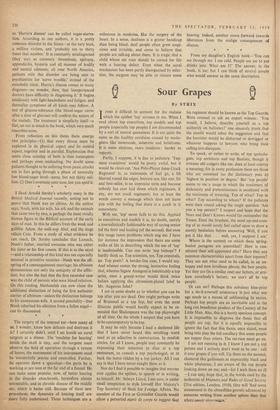Sour Grapes
By STRIX IFIND it difficult to account for the malaise which the epithet 'top' arouses in me. When I read about top executives, top models and top people (especially top people) I am discommoded by a sort of mental queasiness. It is not quite the same as the healthy revulsion caused by neolo- gisms like motorcade, usherette and helidrome. It is more abstruse, more insidious : harder to support.
Partly, I suppose, it is due to pedantry. 'Top- most executives' would be pretty awful, but it would be clean-cut. 'Ace Polo-Player Joins Crack Regiment' is, as statements of fact go, a bit blurred round the edges, because ace, like star, hit and best-seller, is an imprecise term and because nobody has ever laid down which regiments, if any, are not crack regiments; but at least the words convey a message which does not leave you with the feeling that there is a catch in it somewhere.
With me, 'top' never fails to do this. Applied to executives and models it is, no doubt, merely a journalistically fashionable way of saying senior (of the first) and leading (of the second). But even this usage raises problems which nag me. I have for instance the impression that there are some walks of life in describing which the use of 'top' is inadmissible. Can one write lop bishops'? I hardly think so. Top scientists, yes. Top criminals, no. Top poets? A border-line case, I would say. And whence comes the strong, instinctive feeling that, whereas Signor Annigoni is indubitably atop artist, even a gossip-writer would think twice before applying this chromium-plated label to Mr. Augustus John?
I am in some doubt as to whether you can be top after you are dead. One might perhaps write of Brummel as a top fop, but even the most illiterate public would hardly expect to be re- minded that Shakespeare was the top playwright of all time. On the whole I suspect that you have to be contemporary to be top.
It may be only because 1 lead a sheltered life that I have never heard this revolting word used as an adjective in conversation. In modish circles, for all I know, people may constantly be expressing their intention to dine at a top restaurant, to consult a top psychologist, or to back the horse ridden by a top jockey. All I can say is that I have never caught them at it.
Nor do I find it possible to imagine that anyone ever applies the epithet, in speech or in writing, to himself. Mr. Selwyn Lloyd, I am sure, is under small temptation to style himself Her Majesty's Top Secretary of State for Foreign Affairs. No member of the First or Grenadier Guards would allow a perverted esprit de corps to suggest that his regiment should be known as the Top Guards. Were counsel to ask an expert witness: 'You would, I believe, describe yourself as a top authority on ballistics?' one sincerely trusts that the pundit would rebut the suggestion and that the barrister would be disbarred or dewigged or whatever happens to lawyers who bring their calling into disrepute.
To speak, or rather to write, of top speleolo- gists, top architects and top flautists, though it irritates old codgers like me, does at least convey a meaning; for in every profession there are those who are esteemed (as the dictionary puts it) 'highest in position or degree.' But 'top people' seems to me a usage in which the maximum of dishonesty and pretentiousness is combined with the minimum of meaning. Top of what? Top in what? Top according to whom? If the pollsters went their round asking the single question 'Are you a top person?' I suspect and hope that the Noes and Don't Knows would far outnumber the Yesses. Even the brashest, the most up-and-com- ing of us would surely feel called upon to show a seemly hesitation before answering 'Well, if you put it like that . . . well, yes, I suppose I am.'
Where is the summit on which these spring- heeled paragons are assembled? How is con- stituted their self-appointed elite? Have they any common characteristics apart from their topness? They are not what used to be called, in an un- happy and now invidious phrase, the best people. Yet they are (in a similar one) our betters, or any- how somebody's betters; we can't all be top people.
Or can we? Perhaps this nebulous blue-print for a do-it-yourself aristocracy is just what our age needs as a means of sublimating its envies. Perhaps top people are an inevitable and in the long run beneficent product of the Century of the Little Man. Alas, this is a barely specious concept. It is impossible to disprove the thesis that all people are top; but it is equally impossible to ignore the fact that this thesis, once stated, must bring into play the fell corollary that some people are topper than others. The rat-race must go on.
I am not running in it. I know I am not a top person and I actively don't want to be one : call it sour grapes if you will. Up there on the summit, clustered like guillemots in impeccably black and white phalanxes, I am aware of the top people looking down on me; and—for I wish them no in —1 can only hope that, in the words used by the authoress of Manners and Rules of Good Society (31st edition, London, 1910), they will 'find some amusement in the absurdities gravely advanced by someone writing from another sphere than that where samoir vivre reians.'






































 Previous page
Previous page